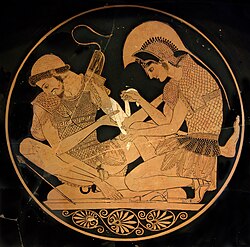Our website is made possible by displaying online advertisements to our visitors.
Please consider supporting us by disabling your ad blocker.
Iliad
| Iliad | |
|---|---|
| by Homer | |
 Inscription of lines 468–473, Book I. 400–500 AD, from Egypt. On display at the British Museum | |
| Original title | Ἰλιάς |
| Translator | George Chapman and others; see English translations of Homer |
| Written | c. 8th century BC |
| Country | Ancient Greece |
| Language | Homeric Greek |
| Subject(s) | Trojan War |
| Genre(s) | Epic poetry |
| Published in English | 1598 |
| Lines | 15,693 |
| Followed by | The Odyssey |
| Metre | Dactylic hexameter |
| Full text | |
| Trojan War |
|---|
 |
The Iliad (/ˈɪliəd/ ⓘ;[1] Ancient Greek: Ἰλιάς, romanized: Iliás, [iː.li.ás]; lit. '[a poem] about Ilion (Troy)') is one of two major ancient Greek epic poems attributed to Homer. It is one of the oldest extant works of literature still widely read by modern audiences. As with the Odyssey, the poem is divided into 24 books and was written in dactylic hexameter. It contains 15,693 lines in its most widely accepted version. Set towards the end of the Trojan War, a ten-year siege of the city of Troy by a coalition of Mycenaean Greek states, the poem depicts significant events in the siege's final weeks. In particular, it depicts a fierce quarrel between King Agamemnon and a celebrated warrior, Achilles. It is a central part of the Epic Cycle. The Iliad is often regarded as the first substantial piece of European literature.
The Iliad and the Odyssey were likely written down in Homeric Greek, a literary mixture of Ionic Greek and other dialects, probably around the late 8th or early 7th century BC. Homer's authorship was infrequently questioned in antiquity, but contemporary scholarship predominantly assumes that the Iliad and the Odyssey were composed independently and that the stories formed as part of a long oral tradition. The poem was performed by professional reciters of Homer known as rhapsodes.
Critical themes in the poem include kleos (glory), pride, fate and wrath. Despite being predominantly known for its tragic and serious themes, the poem also contains instances of comedy and laughter.[2] The poem is frequently described as a masculine or heroic epic, especially compared with the Odyssey. It contains detailed descriptions of ancient war instruments and battle tactics, and fewer female characters. The Olympian gods also play a major role in the poem, aiding their favoured warriors on the battlefield and intervening in personal disputes. Their characterisation in the poem humanised them for Ancient Greek audiences, giving a concrete sense of their cultural and religious tradition. In terms of formal style, the poem's repetitions and use of similes and epithets are often explored by scholars.
- ^ "Iliad". Random House Webster's Unabridged Dictionary.
- ^ Bell, Robert H. "Homer's humor: laughter in the Iliad." hand 1 (2007): 596.
Previous Page Next Page


